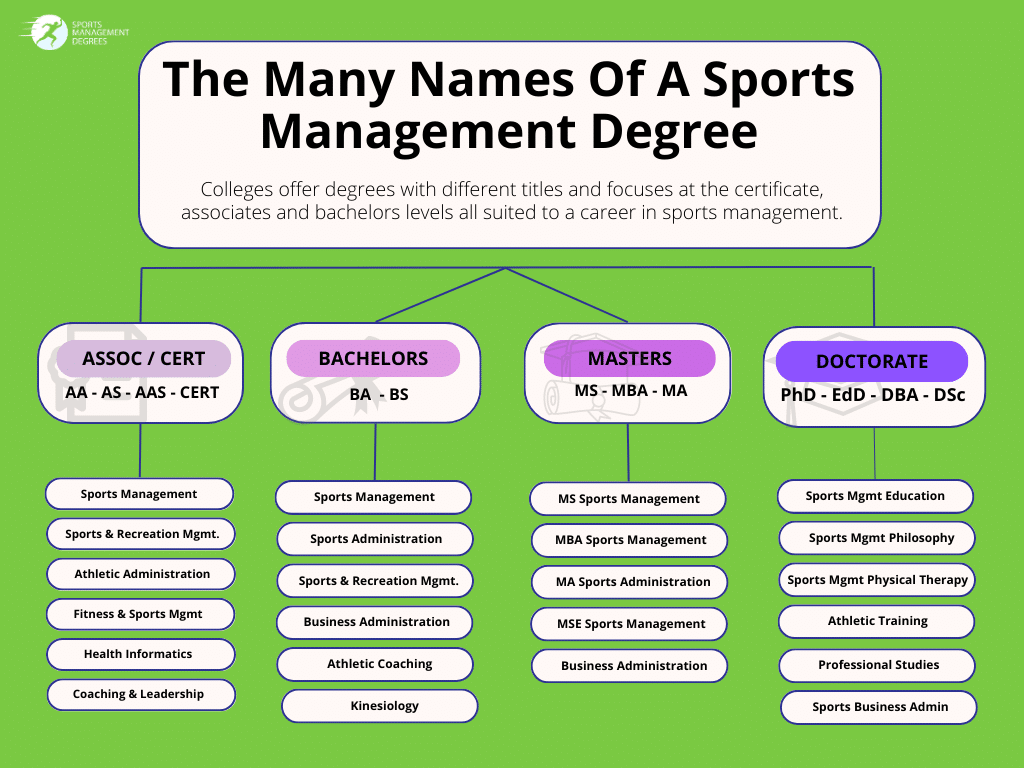
Real Sports Management Graduates. Honest Answers.
More Answers From Sports Management Professionals
4 Steps to Getting a Career in Sports Management
Step 1
Pre-Requisites
High school diploma or GED.
Step 2
Earn a Degree
Earn an Associates, Bachelors or Masters in Sports Management.
Step 3
Certification
Obtain optional certification for your career (e.g CSEE, CAA, CSM)
Step 4
Seek employment
Salary range, $42,480 – $208,000 (BLS 2020).
Best Online Sports Management Degree Programs
Sports management degree programs are offered at the Associate, Bachelors, Masters, PhD degree and Certificate levels. Offered in both campus and online formats, a degree in sports management prepares you for a wide array of careers on the business end of sports.
Want More Options? See Our Directory of Sports Managmenet Programs
What Our Experts Say About Sports Managment Programs
I got my masters in sports management 100% online and I finished that in May of 2000. I would say the advantages was I was able to work in the industry while in school and even just work period and make sure to pay the bills while I was studying. The disadvantages of it is, my goodness, I could easily procrastinate and not do my work.

In my sports management program we put together pitches on a new idea for a stadium or arena, and that was so fun. We put together old school poster boards, and we brought in people from the industry in the area that came and looked through and asked you questions. It was just so fun to chat with people that were in the industry, to really pick their brain. To pitch to people that you could work for one day.

I love working in sports management. The number one thing is that sports are fun, and if you can’t have fun working in a sports business, you really need to reevaluate what business you are in. There’s that old saying that if what you do is fun, you’ll feel that you are never working. I feel like that every day.

School Selection Considerations
Accelerated vs. Traditional Programs
A traditional campus based sports management bachelors degree requires full-time attendance for four years. Over the last twenty years, accelerated online sports management degrees have grown in popularity in large part because they can be completed in as little as 18 months. The following are three pros and cons to consider when evaluating whether an accelerated sports management degree is right for you:
Advantages of Accelerated Sports Management Programs:
- Time: The primary reason people choose an accelerated sports management degree is the dramatic difference in time to obtain a degree. An accelerated bachelors in sports management can be completed in as little as 18 months, versus 4 years with a traditional degree. This has very significant implications on your lifetime earning potential, and is of particular import to people with family obligations or the need to start earning an income sooner.
- Lower Cost: Accelerated sports management online programs allow students to obtain a bachelors in a mere 18 months with some schools, which is more than two years saved. Compared to the tuition of a traditional campus based program, the accelerated program is typically a significant cost savings due in large part to the time savings.
While accelerated online sports management programs offer a number of advantages, they are not the best choice for all students. Here are two disadvantages of accelerated sports management degrees to consider.
Disadvantages of Accelerated Sports Management Programs:
- Intensity of Workload: Although accelerated programs attempt to streamline the curriculum to only focus on the most vital elements in an effort to achieve some of the time savings, a significant portion comes from an increased workload on the student. Not all students are capable of handling this increased workload, and therefore do not learn the material as well.
- Material Covered More Quickly: For some students who retain information quickly and easily, this isn’t much of a disadvantage. But for students who prefer to take things more slowly, or revisit material that they are struggling with, there simply isn’t as much time to do this in an accelerated sports management degree program.
Online vs. Campus Programs
Before you can even consider whether a campus or online sports management degree is better for you, make sure that the campus based schools available to you actually offer the degree. That’s because, sports management is such a new degree that many campus based institutions still do not offer it. Once you’ve confirmed you have a choice, you should weigh both options.
Online sports management programs are a popular option, but they aren’t a good fit for every student. Here are three advantages and three disadvantages for pursuing a sports management degree online:
Advantages of Online Sports Management Programs:
- Flexibility: Perhaps the biggest differentiator between a campus and online sports management program is flexibility. Online programs allow students to work from home or work rather than being restricted to a specific classroom, and for most online programs, students can work entirely on their own schedule and at their own pace. This allows students who have other responsibilities, such as a current job, or family obligations to pursue their degree, and students who are focused and driven can often complete their degree on an accelerated timeline.
- Lower Cost: Accelerated sports management online programs allow students to obtain a bachelors in a mere 18 months with some schools. Compared to the tuition of a traditional campus based program, the online school is typically a significant savings due in large part to the time savings.
- Broader Range of Degrees: Students considering an online sports management degree typically have a much larger range of options for degrees and majors. That is true not only because online colleges typically offer more degrees, but also because students can choose from a far greater number of online colleges, whereas with campus based programs there are geographical considerations which typically limit the range of schools a student can reasonably attend.
Disadvantages of an Online Sports Management Program:
- Limited Interpersonal Interaction: While video conferencing software like zoom has helped close the gap, online sports management programs lack the face-to-face interaction that a campus based degree program offers. This can be particularly important for students who prioritize a collaborative learning environment.
- Less structure: While there are guidance counselors at online colleges, pursuing an online sports management degree undeniably requires students to be more self-disciplined and motivated than a traditional campus based program.
- Less credibility: Particularly true pre-Covid, but perhaps still salient today, some employers may regard an online degree as less prestigious than a campus based degree, and accordingly students may find initial employment more difficult than students from traditional campus based university programs.
In conclusion, getting an online sports management degree offers a number of benefits, but isn’t appropriate for every type of learner.
Degree Selection
Sports management degrees are offered at the associates, bachelors, masters, phd and certificate levels. Each with its own credit hour requirements, average salaries, and career options. Here are the details for each level:
- Associates Degree in Sports Management: An associate’s degree in sports management typically requires 60-64 credit hours and can be completed in 2 years, or 12 months in an accelerated online format. The average salary for someone with this degree is around $35,000 per year. Careers that an associate’s in sports management degree can prepare you for include:
- Sports event coordinator
- Sports facility manager
- Athletic coach
- Sports marketer
- Sports journalist
- Bachelor’s Degree in Sports Management: A bachelor’s degree in sports management typically requires 120-130 credit hours and can be completed in 4 years, or 2.5 years in an accelerated online program. The average salary for someone with a bachelors in sports management degree is around $50,000 – $60,000 per year. Careers that a bachelor’s degree can prepare you for include:
- Sports agent
- Athletic director
- Sponsorship manager
- Sports information director
- Sports marketer
- Master’s Degree in Sports Management: A master’s degree in sports management typically requires 30-36 credit hours and can be completed in 2 years, or 1 year in an accelerated online degree program. The average salary for someone with a masters degree in sports management is around $70,000 – $80,000 per year. Careers that a master’s degree can prepare you for include:
- Sports marketing manager
- Athletic program director
- Sports analytics specialist
- Sports business development manager
- Sports facility manager
- PhD Degree in Sports Management: A PhD in sports management typically requires 60-70 credit hours and can take 4-5 years to complete, though an accelerated online doctoral program can be completed in 2-3 years. The average salary for someone with a PhD in sports management is around $100,000 – $120,000 per year. Careers that a PhD can prepare you for include:
- Sports researcher
- University professor
- Sports policy analyst
- Sports economist
- Sports law expert
- Certificate in Sports Management Program: Certificate programs in sports management can vary dramatically in length and credit hours, typically ranging from a few weeks to a year. The average salary for someone with a certificate in sports management similarly varies significantly based on their prior experience and educational attainment. Careers that a certificate in sport management program can prepare you for include:
- Sports sales representative
- Sports marketing specialist
- Athletic administrator
- Event coordinator
- Social media manager
Certification Requirements
Obtaining a certification in sports management is largely optional for most careers in the field (although some employers may require one). But even if it is optional for your preferred career, it is worth considering because it indicates to potential employers a level of competence and dedication to your field. A few of the more popular certifications in sports management are:
- Certified Athletic Administrator (CAA) – offered by the National Interscholastic Athletic Administrators Association (NIAAA), this optional certification is for individuals who work in high school or middle school athletic administration.
- Certified Sports Manager (CSM) – offered by the Sports Management Institute (SMI), this optional certification covers topics such as sports marketing, media relations, and event management.
- Certified Facility Manager (CFM) – offered by the International Facility Management Association (IFMA), this optional certification is designed for individuals who manage sports facilities such as stadiums, arenas, and gyms.
- Certified Sports Event Executive (CSEE) – offered by the National Association of Sports Commissions (NASC), this optional certification is directed to individuals who work in sports event planning and management.
School Accreditation
Accreditation is a voluntary process, and not all colleges choose to become accredited. That said, however, accreditation is an important signal that the university and the sports management program it offers meet certain objective third party standards of quality. Moreover, in a competitive field like sports management, many employers will restrict their search for candidates exclusively to accredited colleges and universities. Accreditation is also important for students who plan to transfer credits or pursue further education, as other schools may not recognize the credits or degree earned.
To find out if your sports management college program is accredited, you can check with the following organizations:
- Commission on Sport Management Accreditation (COSMA): COSMA is the accrediting agency specifically for sports management programs. You can search their database to see if your program is accredited.
- Council for Higher Education Accreditation (CHEA): CHEA is a non-profit organization that recognizes accrediting agencies for higher education programs. You can search their database to see if your program is accredited by a recognized accrediting agency.
- U.S. Department of Education: The U.S. Department of Education maintains a database of accredited postsecondary institutions and programs. You can search their database to see if your program is accredited.
Degree Content
Sports management is a very broad field, and as a consequence, colleges offer degrees which all bear the name sports management, but which can have very different content and focuses. It is important to look into these differences to confirm that the degree program you choose will prepare you for your preferred career.
Broadly speaking, however, in a sports management degree program, you’ll focus on learning business tactics like budgeting and marketing. Classes may look like the following:
- Sports Law
- Sports Marketing
- Budgets and Revenue in Sports
- Structure and Organization of Sports Programs
- Event Promotions for Sports
Internships
Internships are particularly important in competitive fields like sports management, for obtaining your first job. You have to have the smarts and the qualifications to get the interview, but oftentimes getting your first job is primarily about relationships. Therefore, it’s important to consider whether your school’s sports management program includes access to internships.
In some cases, your college will set you up with an internship. Alternatively, you may have options created for you, but you’ll have to interview for an internship, and finally at some colleges you’ll be entirely responsible for finding your own internship. For some students, the prospect of finding an internship on their own is not daunting, whereas for other students, the knowledge that their college will arrange things for them is very appealing. Simply be mindful about what kind of person you are, and consider the necessity of internships and the role that your school plays in them as one factor in choosing a sports management degree program.
Of note, it is important to apply for internships early on if you will be responsible for finding your own. Sports internships are extremely competitive and for some, it may be a numbers game. The more you apply for, the more chance you have of landing an internship. Some internships may pay a small stipend, but the majority will be unpaid and offer school credit. Regardless of payment, most internship programs receive hundreds of applicants every semester.
Explore More
Resources & Gallery
Learn More About Careers in Sports Management, Salary, and Degree Options Through These Articles, and Use Royalty-Free our images of cartoon sports managers at work:














